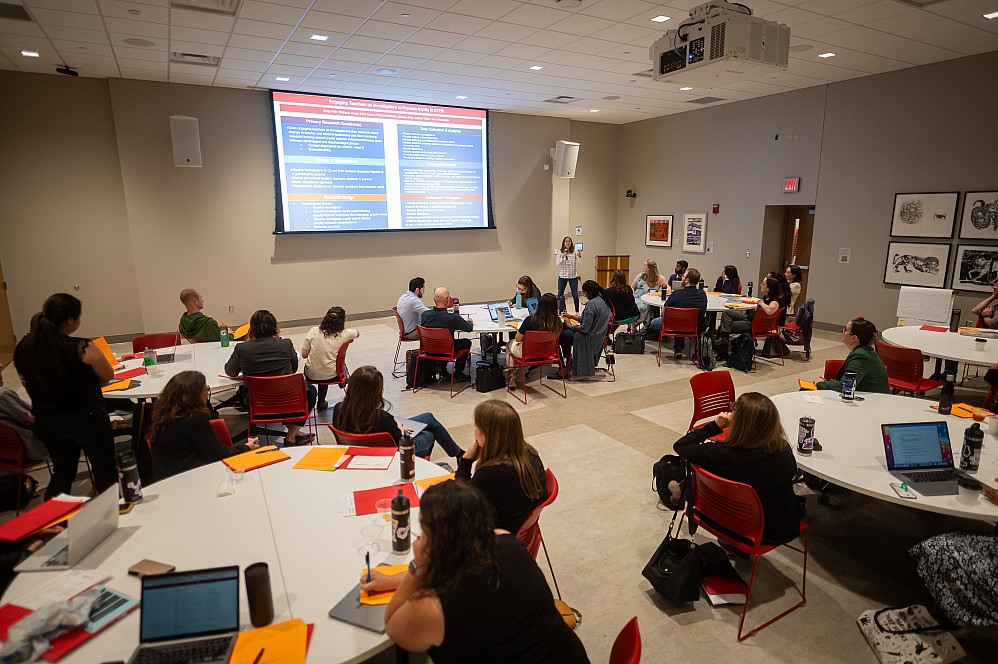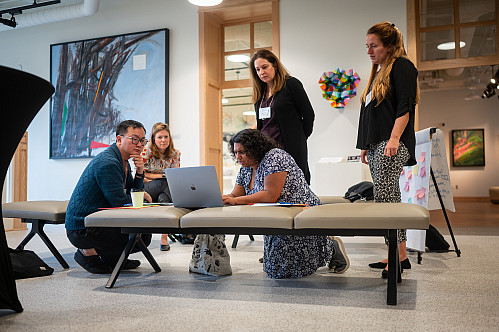INTERACT Incubator works with partners to advance equity in STEM education
By Kirk Johannesen
December 11, 2023

Researchers around the country convened at Indiana University Bloomington this fall to heed the call for better research on students who are traditionally left out of science, technology, engineering and mathematics fields, and to advance greater equity in STEM education.
The National Science Foundation had published a Dear Colleague Letter in 2022 about a new funding opportunity for incubators and conferences in service of creating research infrastructure to foster equity in STEM. Professors in the Department of Psychological and Brain Sciences in the College of Arts and Sciences at IU Bloomington are leading the INTERACT Incubator and hosted its 2023 convening in late October.
The INTERACT Incubator brings together leading experimental social and cognitive psychologists along with teachers, K-12 administrators and other stakeholders from across the nation who are interested in advancing equity in STEM teaching and learning. The incubator builds a bridge between psychological science and STEM teaching and learning in practice, said Ben Motz, a co-leader of the incubator and assistant professor in psychological and brain sciences.
But this isn’t just an effort to dream big; it’s an effort to make concrete designs with the potential to make radical change. The goal of the INTERACT Incubator is to ultimately prepare a proposal for the National Science Foundation that could result in a grant of up to $100 million to implement the infrastructure needed for advancing equity in STEM, Motz said.
“I believe this could make the world a better place,” Motz said. “There are major segments of education that are disenfranchised.”
The convening, conducted in the McCalla School building, attracted about 40 participants They were conducted a needs assessment for infrastructure — facilities, equipment, instrumentation, data repositories, computational hardware or software, and human capital — that would close the equity gaps. When the group reconvenes in September 2024, the focus will be on outlining the ideal infrastructure.
Presentations to the group informed participants about things to consider when they broke into small groups. Stephanie A Goodwin, president of Incluxion Works, discussed issues of identity that are central to STEM equity: how people identify and describe themselves, language used, and the impact of social status and hierarchies. Mary Murphy, incubator co-leader, psychological and brain sciences professor and Class of 1948 Herman B Wells Endowed Professor, discussed the Student Experience Project and creating practices that result in greater student academic performance and retention, and how that could help the work of the INTERACT Incubator.
“There’s an opportunity in front of us with this convening to think of levers of change for infrastructure needs,” Murphy said.

Harmony Jankowski, a member of the INTERACT Incubator steering committee, said that breaking into small groups was a process for cultivating, refining and narrowing ideas. Participants discussed topics such as classroom practices in gateway STEM courses in middle and high school, and the impact that has on enrollment, retention and experience.
Until the next convening, the small groups will meet virtually or have discussions through chat groups to further discuss and refine their ideas.
Ming Shelby, director of professional learning for Batavia (Illinois) Public School District 101, said she appreciated the opportunity to participate in the incubator convening. Previous professional interaction with Motz led to an invitation, and she thought it was important to attend to see how this could benefit the district’s students.
“We’re always thinking, ‘How do we get more kids involved in STEM?’” Shelby said.
She said that higher-level math and science courses in the school district have more male students; they comprise 52 percent of the total student population but represent 59 to 76 percent of the students in the following courses:
- Calculus I and II.
- Physics, AP physics, AP physics II.
- Computer science principles.
- Introduction to engineering design.
- Principles of engineering.
Shelby said that her group focused on dreaming big instead of limiting ideas to what seems practical or merely feasible. She added that IU was a great host for the convening and created a welcoming environment, and that Motz fostered a sense of belonging among individuals and groups. She thought that everyone’s voice was heard.
“I loved the convening,” Shelby said. “I got to hear different people who brought different perspectives all focused toward a goal.”
Kirk Johannesen is a communications consultant in the Office of the Vice President for Communications and Marketing.